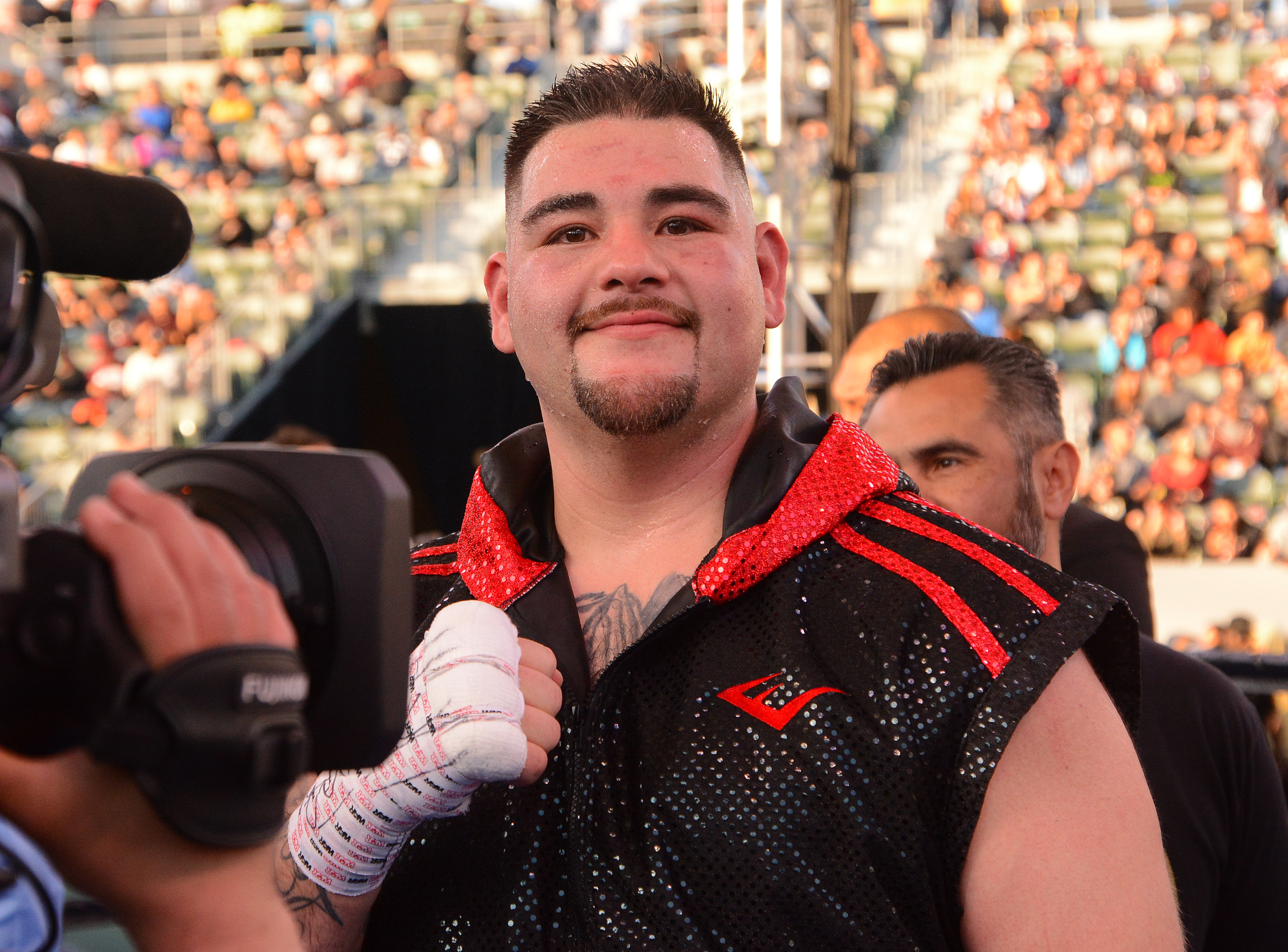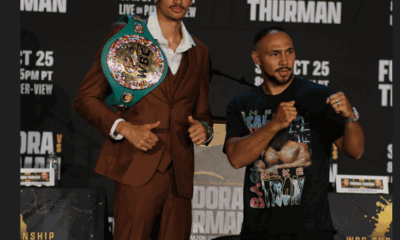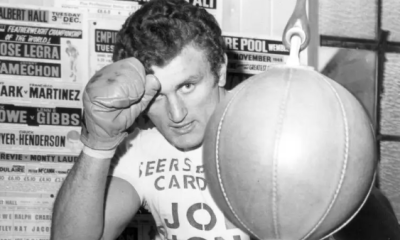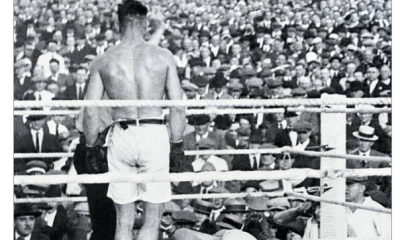Featured Articles
It Wasn’t The Queen That Needed Saving as Andy Ruiz Jr. Dethroned Anthony Joshua

NEW YORK – The sellout crowd of 20,201, a significant percentage of whom had journeyed here from the United Kingdom, warmed up for the main event by turning Madison Square Garden into a mass karaoke performance. First they warmed up by loudly singing along to Neil Diamond’s “Sweet Caroline” before attaining an even higher decibel level with an enthusiastic rendition of “God Save the Queen.”
As it turned out, it wasn’t Queen Elizabeth II who needed salvation Saturday night, but magnificently sculpted Briton Anthony Joshua, widely considered by this Union Jack-waving audience as the one, true king of the heavyweights. Although the 6-foot-6, 247-pound Joshua always has looked the part of an unconquerable warrior monarch, on this historic night he would be exposed as something less by a chubby fill-in opponent whose longshot bid to end AJ’s royal reign must have seemed only a bit more likely than one of his comparatively few on-site supporters winning the Powerball Lottery.
In what arguably was the most shocking upset since Buster Douglas knocked out seemingly invincible heavyweight champion Mike Tyson in Tokyo on Feb. 11, 1990, Ruiz (33-1, 22 KOs) arose from a third-round knockdown – the first time he’d been on the deck as a pro – to floor a stunned Joshua (22-1, 21 KOs) twice in the same round before tacking on two more knockdowns in round seven. Although Joshua beat referee Michael Griffin’s count after his fourth trip to the canvas, he stepped backward, on unsteady legs, to a neutral corner and put his arms atop the highest strand of the ropes. Griffin quite reasonably interpreted that as a sign of surrender and awarded Ruiz a technical knockout victory after an elapsed time of 1 minute, 27 seconds.
Thus did the seventh title defense for Joshua, the super heavyweight gold medalist at the 2012 London Olympics who was fighting for the first time on American soil, end on a discordant note. But the flip side of his supporters’ dejection was the sight of Ruiz, his considerable love handles jiggling like a shaken gelatin mold, leaping in exultation as his corner team rushed forward to celebrate with him.
Not that Ruiz, a U.S. citizen from Imperial Calif., who became the first fighter of Mexican descent to capture a world heavyweight championship, had surprised himself along with the thousands in attendance and many more around the world who watched the fight via the DAZN streaming service. No, far from it. Ruiz insisted he had known all along that he had all the attributes to defeat Joshua, his lack of a magnificent physique notwithstanding.
“Nobody thought I was going to win, but everybody that bet on me is going to make some serious money,” a smiling Ruiz said at the postfight press conference. (He went off at +1100 in the Las Vegas sports books, yielding a profit of $1,100 to anyone who bold enough to risk a $100 wager on him.)
“Before this fight was going to happen I was saying in a lot of interviews that I would rather fight AJ than any other heavyweight out there. I knew that I could beat him. Every fighter has flaws and I think AJ has bigger flaws than Deontay Wilder and Tyson Fury.”
Wilder, the WBC heavyweight champion who has steadfastly maintained that it is he who most deserves to be recognized as the best of boxing’s big men, wasted no time in concurring with Ruiz’s estimation that Joshua, who had entered as the WBA, WBO and IBF titlist, has never deserved to be recognized as the No. 1 guy, and maybe not even as No. 2 or 3 or possibly even 4.
“He wasn’t a true heavyweight champion. His whole career was consisted of lies, contradictions and gifts,” Wilder almost giddily tweeted after Ruiz chopped down the Joshua tree. “Facts, and now we know who was running from who!”
Until the 6-2, 268-pound Ruiz backed up his bold talk with action, the heavyweight division was widely considered to be comprised of a top tier of Joshua, Wilder and lineal champion Tyson Fury, with everyone else occupying lower rungs on the ladder. Now the round-robin tournament almost everyone in boxing had hoped would happen, with Joshua, Wilder and Fury sorting things out among themselves, has had that exclusive party joined by a gate-crasher who, upon further reflection, probably always was more dangerous than many had imagined. That sometimes happen with fighters – any athletes, actually – who fail to score high on the eye test. More than a few naysayers have dismissed Ruiz as a legitimately elite heavyweight because what first caught their attention is his paunch instead of his quite respectable punch, not to mention his nimble feet and fast hands for a guy who, by his own admissions, will never be a male underwear model.
Although Ruiz has officially weighed in as high as 292½ pounds as a pro, and his weight for the Joshua bout was five pounds heavier than he had come in at for his most recent ring appearance, a fifth-round stoppage of Alexander Dimitrenko on April 20 in Carson, Calif., that outing took place just five weeks before he took on AJ. He was, by his somewhat relaxed standards, in excellent condition.
Still, some of the questions that were posed to Joshua’s promoter, Eddie Hearn of Matchroom Boxing, regarded the possibility of Joshua having taken Ruiz too lightly, if you’ll pardon the expression, or Ruiz being chosen because he might have been considered a relatively soft touch after the originally scheduled opponent, Jarrell “Big Baby” Miller, was obliged to withdraw after failing three separate drug tests for banned substances. Hearn insisted that neither suggestion held any merit.
“I said in the buildup that this is a tougher fighter for Anthony than Jarrell Miller,” Hearn said. “They’re not dissimilar in (physical) stature, but Andy’s faster, he has better movement, a better boxing IQ. The Miller fight would have been much easier.”
But if Ruiz constituted such a threat, why didn’t Hearn replace Miller with Manuel Charr or Trevor Bryan, both of whom were lobbying for the pinch-hitting role and the fat payday that came with it?
“We wanted to give a proper fight,” Hearn answered. “With all respect to Manuel Charr and Trevor Bryan, they’re not worthy challengers. We wanted a proper test for AJ. When you come to Madison Square Garden, you’ve got to give the public a real fight. We knew that Andy Ruiz would give Anthony Joshua a real fight. Unfortunately, he gave him more of a fight than we hoped he would. We really felt that Anthony is the best heavyweight in the world and he would win tonight.”
Hearn said Team Joshua would enforce the clause for an immediate rematch, most likely to be held in November or December in the United Kingdom. It will be interesting to see if Joshua, whom Hearn said “will be absolutely devastated” when the realization of what had just happened kicks in, can replicate the feat of countryman Lennox Lewis, who was knocked out by Oliver McCall and Hasim Rahman, but came back to avenge those losses in emphatic fashion.
“Great fighters come back and improve,” Hearn noted. “Some fighters come back the same (and lose again to the guy that beat them). The future will show how Anthony Joshua responds.”
For his part, Ruiz – who succeeded where past Mexican or Mexican-American heavyweight title challengers Chris Arreola (three times), Eric Molina (twice), Manuel Ramos and even Ruiz himself, in an earlier bout with then-champion Joseph Parker, didn’t – said he doesn’t anticipate being a one-hit wonder.
“I’m still pinching myself to see if this is real, man,” he said. “But this is not the only victory that I get. I’m not going to let the belts go.”
It might require another win inside the distance over Joshua, on his home turf, to convince any remaining doubters that Ruiz isn’t simply some incredibly lucky guy who caught a superior fighter on an off-night. At the time of the stoppage two judges – Julie Lederman and Michael Alexander – had Ruiz up by a single point, 57-56, while the third judge, Pasquale Procopio, actually had Joshua ahead by the same tally.
“I did not want to leave it up to the judges,” Ruiz said, a frame of mind he no doubt will carry into the do-over.
Several Undercard Bouts Also Were Keepers
A stellar undercard was punctuated by several bouts that were main-event worthy, the most notable of which was won by Callum Smith.
Smith (26-0, 19 KOs), the 6-foot-3 super middleweight from Liverpool, England, knocked down former three-time world title challenger Hassan N’Dam N’Jikam (37-4, 21 KOs) once in each round en route to being awarded a third-round TKO, enabling him to retain his WBA 168-pound belt as well as his WBC Diamond belt. Smith again called out unified middleweight champ Canelo Alvarez.
Photo credit: Al Applerose
Check out more boxing news on video at The Boxing Channel
To comment on this story in The Fight Forum CLICK HERE
-

 Book Review4 weeks ago
Book Review4 weeks agoMark Kriegel’s New Book About Mike Tyson is a Must-Read
-

 Featured Articles3 weeks ago
Featured Articles3 weeks agoThe Hauser Report: Debunking Two Myths and Other Notes
-

 Featured Articles3 weeks ago
Featured Articles3 weeks agoMoses Itauma Continues his Rapid Rise; Steamrolls Dillian Whyte in Riyadh
-

 Featured Articles3 weeks ago
Featured Articles3 weeks agoNikita Tszyu and Australia’s Short-Lived Boxing Renaissance
-

 Featured Articles4 weeks ago
Featured Articles4 weeks agoKotari and Urakawa – Two Fatalities on the Same Card in Japan: Boxing’s Darkest Day
-

 Featured Articles3 weeks ago
Featured Articles3 weeks agoIs Moses Itauma the Next Mike Tyson?
-

 Featured Articles2 weeks ago
Featured Articles2 weeks agoBoxing Odds and Ends: Paul vs ‘Tank,’ Big Trouble for Marselles Brown and More
-

 Featured Articles3 weeks ago
Featured Articles3 weeks agoAvila Perspective, Chap. 340: MVP in Orlando This Weekend




















